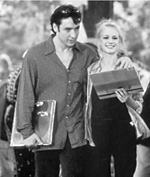DON’T TALK TO Johnny Dowd about the art of being sinister. After giving Nick Cave’s Murder Ballads a run for their money, the 51-year-old country singer is puzzled why people—particularly music critics—are afraid of his Southern gothic vignettes. In his eyes, he’s writing love songs. But what everyone else hears on his latest album, Pictures from Life’s Other Side (Koch), are twisted tunes about stalking, makeout sessions that end in tragedy, and the dirty minds of dirty old men.
To Dowd, being twisted is just a natural part of being in love. “Real love—which involves mutual respect and friendship—is one thing,” he says in a rich Oklahoma-meets-New-York drawl. “But sexual love produces a kind of insanity and drunkenness. You’re not that much in love if you don’t do a bunch of stupid shit.”
A wiry man with salt-and-pepper hair, Dowd’s story is like a snippet from This American Life. After 30 years of odd jobs, divorce, and a stint in the military, Dowd decided to learn how to play guitar. At the age of 49, he recorded his first album at the trucking company he co-owns in upstate New York. When it came time to release Wrong Side of Memphis, he typed a rough letter to send out with his tapes. It said, “If rock ‘n’ roll is a religion, I’m a preacher in need of a church.”
The response to Dowd’s dark-hearted album was enough to make the grizzled singer-guitarist blush. Critics and alt-country lovers ate up his fire-and-brimstone songs. “It was just a fluke,” Dowd swears. “It was like a TV show, where you’re down on your luck, you send a little tape out, and all of a sudden you’re written up in Billboard.”
MOST OF US should feel relieved that Dowd is occupied by songwriting; the misery and doomsday wit that doggedly follow his fictional characters indicate that maybe more than a little of it is based on truth. Though lyrically less of a bloodbath than his last effort, A Picture from Life’s Other Side plants its roots in more than a few details of Dowd’s real life. “The Ballad of Lonnie Wolf” is the pitiful tale of a man Dowd knew who tried to commit suicide but unfortunately lived to tell about it. The singer’s stint in the army lends credibility to “Vietnam,” while “Butcher’s Son” is inspired by Dowd’s years of hacking up meat in a family butcher shop.
But what about all the twisted songs about women, the ones Dowd swears are love songs? In the bluesy spoken-word track “No Woman’s Flesh But Hers,” the narrator wrecks his car while trying to unzip his wife’s pants; she ends up in a coma for three years, but he swears not to betray her. On “Hope You Don’t Mind,” Dowd’s nasal drawl quivers over a gentle, almost bossa nova beat: “I looked in your window last night/Hope you don’t mind.” Many tattoos and confessions later, it becomes clear that his crush is an unsuspecting schoolgirl. Apparently, a valentine from Johnny Dowd comes sealed with a bloody thumbprint.
For his newest album, Dowd gathered a full band, fleshing out his creaking sounds of despair and passion with bluesy undertones. Some shimmer with old-timey country cheer, like the cello and xylo-driven “Just Because.” Kim Sherwood-Caso adds chiming vocal counterparts on many, giving “God Created Woman” and “The Girl Who Made Me Sick” a haunted but less sinister quality, similar in tone to Tarnation’s songs.
Behind the curtain, though, Dowd has less self-esteem than Elliott Smith. He shrugs off his place in music by explaining that it’s just like his day job: “You drive a long way, and at the end you unload a bunch of stuff; the only difference is trucking pays you more.” He hesitates to call himself an artist, using the word “performer” instead. “As a performer,” he explains, “the main moral lesson I get from people I admire is that they’re always taking risks, making fools of themselves.
“The older you get, the less you wanna look stupid,” he says.
Just don’t expect Dowd to be tame in a live setting. The singer says he went years without noticing that on average only six people were at a gig, because he lets the demons loose when he plays. “In my head, there were thousands of people at my shows,” he reflects. “I was like Bruce Springsteen at the Meadowlands.






